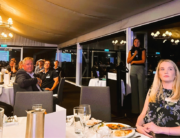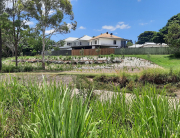Grant Witheridge is a life member of Stormwater Queensland and is the principal of Catchments & Creeks Pty Ltd, and a leading authority in Hydraulics, Stormwater Management, Waterway Management and construction site Erosion & Sediment Control.
Grant has over 40 years’ experience in the investigation, modelling and design of hydraulic structures, including 7 years at the University of NSW Water Research Laboratory. Grant has both a Degree and Masters in Civil Engineering from the University of NSW.
Finding Your Way in the Stormwater Industry, by Grant Witheridge
There will be times in your career when you will have a choice in which path you take and then there will be times when your career path seems to be chosen for you. In time, doors will open and new opportunities will be presented to you. So, when you are faced with a career choice, what direction should you choose?
Do you continue to ‘climb the ladder of success’, do you follow the money, or do you follow your heart? Unfortunately, I don’t have the answers to any of these questions, but then neither does anyone else. Ultimately it will be up to YOU to find your own answers based on your past experience, family and financial pressures, and any advice you may choose to listen to.
I may not have all the answers, but over a career of 40 years I have learnt some lessons that may help you to find your way within the stormwater industry.
1. What type of organisation should you work for?
In the stormwater industry, you can choose to work in a government-based job, or in the private sector. Some people may advise you that it can be difficult to move from one sector to the other, but it isn’t really that difficult. Some people will not have the personality to survive in the private sector, and some people should never be given the responsibility of a government job.
It is very important that you are honest with yourself. Don’t try to fit into either one of these sectors just because a job is offered to you, or members of your family have worked, or currently work in one of the sectors. In other words, don’t try to wear the ‘family’ glove; wear the glove that best fits your own hand.
Over the years, I have works for Federal, State and local government organisations, as well as the private sector. Obviously, my experience will not be the same as that experienced by other people, and I am sure many people will disagree with my opinions, but here is what I have learnt.
In a Federal government job, you can feel very distant from the public. Consequently, I recommend that people gain some local government or private industry experience before entering a stormwater related federal government job, even if the job is teaching at a university.
A State government job can put you in a position where you can have a strong influence over the direction of the stormwater industry, its research, and innovation. In the State government, you can find yourself working with some of the greatest minds in the stormwater industry, but sometimes not so much.
In my opinion, if you want to make a real contribution to the stormwater industry while working for a State government body, then you need to be strongly self-motivating. The State government is full of ‘sheep’ and ‘shepherds’, but in some cases can be lacking ‘sheepdogs’. The right type of person can do a lot of good in the state government.
A local government job can be the most ‘grounded’ job within the stormwater industry. Personally, I found the job as a local government stormwater engineer to be my most rewarding work experience. You can be in a position to really help the public by solving drainage and flooding problems, but don’t expect to be thanked for anything you do. One of the unfortunate aspects of a local government job is that many people, both within and outside the industry, will understate your intelligence. It is sad that so many people judge you based on who you work for, rather than on the work that you do.
In the private sector, you can find yourself working on jobs from all over the country. The hours can be long, and the pay is often no better than a government job. It can be a very different experience from that of a government job, and many people prefer these working conditions. The one thing that I noted is that many people, especially government employees, treat you as the ‘enemy’, just because you may, from time to time, do work for developers.
There is certainly no lack of confidence within the private sector. If you asked ten consulting engineers if they have the expertise to solve a certain drainage problem, then eleven of them will say ‘Yes’.
If you find yourself in the private sector, then I would give you the following advice: (i) Don’t listen to the person that wants you to focus only on customer satisfaction without due consideration of the quality of the engineering design. (ii) Always follow your own moral compass, and not that of your client, or your supervisor. (iii) The best person to listen to is unlikely to be the person with the loudest voice. (iv) Constantly reflect upon Engineers Australia’s ‘Code of Ethics’, even if you are not an engineer.
Ask yourself; do you want to be seen as a sheep, a sheepdog, or a shepherd? A ‘sheep’ simply follows what everyone else does; oh and seems to spend a lot of the day eating. A ‘sheepdog’ is an independent worker that follows directions, does most of the hard work, makes the boss look good, and does it all with just the smallest acknowledgment from the boss. A ‘shepherd’ sets the agenda, spends most of the day sitting in a place that has a good view, and is the person that carries both the cheers of success, and the burden of failure.
2. What field of the stormwater industry should you work in?
The stormwater industry includes the fields of research, planning, design, regulation, enforcement, construction, investigation, supervision, management, and teaching; and that is probably just half of the possible job descriptions.
Over my career, I found my enjoyment of a particular job depended more on who I was working for, and who I was working with, than the actual work that I was doing. Even spending hours photocopying a report for the boss can be enjoyable. Any job can be enjoyable, any job can be a pain.
No matter what the job, YOU can make a job worth doing, but then your actions, or lack of action, can also make your job a waste of time. You don’t need to write a technical paper, draft a design manual, or develop a new engineering equation in order to successfully contribute to the stormwater industry, you just need to do your job properly.
The following discussion is just my opinion based on my experience. I could be right, but then I could also be wrong.
Design – Working in a design office can be very rewarding because you can get to the stage in your career where you able to drive through a city and see things that you actually inspired and/or designed. The difficult aspect of working in a design office is knowing when to follow instructions, and when to say ‘No’.
You may be asked to design a major stormwater structure, and then be told that the design must be completed by the end of the week. If you know that that is not enough time. If you know that someone could be harmed if the design is rushed, then you need to make your feelings known. If you are overruled, then record the events in your diary. A ‘good’ worker is not a silent worker, no matter what your supervisor says.
If you are asked to design a major stormwater structure, and you know that this structure could present a safety risk to the public, such as the design of an energy dissipater on a stormwater outlet, or the design of a stormwater system within a school or childcare centre, then by all means make your concerns known to the right people. Keep a work diary, and make detailed notes. And if necessary, be willing to say ‘No’.
Development assessment – There is no question that the development industry has its fair share of corrupt and unlawful behaviour. Development assessment typically occurs within local governments, but also occurs, to a lesser degree, in the state government. If you find yourself in a job where you are required to assess the stormwater aspects of a development proposal, then all I can ask is that you focus on your job, and not on what others are, or are not doing.
It is not your job to ‘fix’ the system. Don’t get upset if you follow the rules without fear or favour, only to have someone further up the ladder bend the rules, because that is how the system works. Your job is to follow the rules. It is your supervisor’s job to know when to bend or break the rules. That IS how the system works.
If you are checking someone else’s work, then don’t spend your time checking that they got there mathematics right; instead, check that they did the right type of analysis. If you find something wrong, then don’t try to report or fix the issue simply because it is wrong. Ask yourself: Does the mistake matter, and will the public, or the environment, be harmed by this mistake? I alway held the opinion that the most important task was to ensure that a proposed development does not turn into a maintenance burden for the future asset owner (which is usually a council).
Enforcement – Working in the enforcement industry is another job where you need to have the right personality for the job. So much potentially good work in the stormwater industry can be undone simply because of inadequate enforcement. The best type of enforcement officer is not the person that knows the rules and is unbending in its enforcement, but the person that both knows the rules, and the logic behind the rules.
You don’t have to be an ex-police officer in order to be a good enforcement officer, and you can’t be the type of person that wants to make everyone happy.
Floodplain management – These days, the profession of floodplain management attracts a lot of people that enjoy using complex software programs.
‘Sheep’ should be banned from the flood management industry. This is an industry that only has room for ‘sheepdogs’ and ‘shepherds’. A floodplain modeller that understands the software programming, but not the hydraulic theory behind the software programming, is a dangerous individual. The ‘wrong answer’ presented in a colourful, three-dimensional diagram, is still the wrong answer!
A ‘good’ floodplain manager not only has expertise in hydraulics and numerical software, but also in human behaviour. Importantly, floodplain managers need to understand (i) how people are likely to behave during a flood, and (ii) how best to communicate with people that are currently experiencing shock—I refer here to the Kubler-Ross model of the Five Stages of Grief.
Planning – I have found that the success of a Stormwater Management Plan, or a Master Drainage Plan, depends more on the existence of a ‘champion’ who can carry the plan forward, rather than on the quality of the plan.
A really, really, good stormwater plan can become just a distant memory if the planning department gains a new manager. It appears to be just human nature that we want to throw away all the plans prepared under the direction of the previous manager, and then start everything afresh. This is not a reflection of Town Planning. Town Planning is a very useful process. Unfortunately, from my experience, the preparation of most stormwater management plans is just a means of transferring money from the government into the private sector.
Research – A career in stormwater research can be very rewarding. Unfortunately, I have found that many people in the research field eventually take on the attitude that they are so much smarter than everyone else in the industry, simply because they work in research. In my opinion, the moment you start thinking that you are better than the person next to you, is the moment that you stop learning from the person next to you.
My advice is simple: don’t focus on doing research simply because it expands our knowledge of stormwater; instead, focus on research that solves current and expected problems. Ask yourself: what is stopping us from achieving a better stormwater outcome, and how do we remove those barriers.
Waterway management – When I worked as a creek engineer, if a client asked for a simple, and CHEAP, solution to an erosion problem, then my response was not to produce the requested single option, but to produce at least three concept designs. One that was cheap on materials, but typically involved significant labour (often the preferred option for clients that intend doing the work themselves). The second option was expensive on materials, but required minimal labour (often the option preferred by governments). The third option was the ‘Rolls-Royce’ solution that focused on the principles of Natural Channel Design.
The result was that about 50% of the time the client would come back and ask for a detailed design of the Rolls-Royce option. You need to be very careful with this approach to your work because you can get a reputation of not listening to your client. It is true that we want a happy client, but it is also true that many clients don’t know what they want until they see it. I would like to say that your supervisor or manager should guide you through such a process; but, I don’t remember too many supervisors suggesting that I deliver three different concept designs when the client only asked for one.
3. Don’t accept a job or a promotion just because it is offered to you
It is likely that you already know which field of the stormwater industry you would like to work in. Often the bigger decision is how long should you spend doing a particular job before you look for opportunities to climb the ladder, and eventually move into a supervision or management job. When I started my career back in the 1980s it was generally accepted that the first five years of your career would be a major learning period. During this five year period, engineers were encouraged to trial as many of the fields of the stormwater industry as possible, before settling into a field that would dominate the rest of your career.
Today, things are very different, there seems to be less supervision of junior engineers by senior engineers, often because the senior engineers have only limited experience with the design procedures, or design software, that the junior engineers are currently using. Also, junior engineers are expected to utilise the latest software the moment they enter the design office.
During the latter stages of my career, I saw engineers move into supervision and management roles after just two years in the work force. And from what I experienced, most were able to do the job of management, but not necessarily the job of supervision.
These days, there is a good chance that your supervisor will not actually understand how to do the job that you are expected to do. That is not necessarily a bad thing, but it usually is. Other than my time working at the University of NSW Water Research Laboratory, I have spent most of my career being supervised by people that did not really understand what I was doing. All I needed was for them to tell me which projects should take priority, when the projects should be completed, and what percentage of the project’s budget I had already spent.
In summary, you don’t need to understand the work in order to ‘manage’ the work force. What makes a good manager is not what makes a good designer, and what makes a good designer is not what makes a good manager. However, it is my opinion that ‘supervisors’ (i.e. the senior engineers that are signing-off on the job) must both understand the job, and the science behind the job, even though their experience may have been in an earlier version of the design software.
Before you decide to ‘climb the ladder of success’, ask yourself if this is the right move for you at this point in time.
Remember the Peter Principle; ‘people in a hierarchy tend to rise to a level of respective incompetence’. Meaning; if employees are promoted based on their success in their previous job, then their promotions will likely stop once they reach a level at which they are no longer competent.
Don’t fall into this trap. Recognise your limitations, respect your limitations, but that doesn’t mean you should let your limitations define the rest of your career.
In most jobs, the further you climb up the ladder, the further you get away from doing actual stormwater design. This may be something you want—if so, then go for it. For me, I didn’t want to spend my days quoting on new jobs, and checking employee time sheets. I wanted to spend my time actually doing stormwater research and design. Unfortunately, in the stormwater industry that meant I had to say ‘no’ to promotions, and accept a lower annual income.
There is nothing wrong with a career that involves quoting on new jobs, checking employee time sheets, and going to endless meetings, if that is what you enjoy. But if it is not what you enjoy, then don’t accept a promotion just because it is what everyone expects of you. Find the ‘glove’ that fits, not the glove that is offered to you, or the glove that has been left behind by a departing colleague.
The End.
P.S. If readers find this paper informative and if the interest still exists, then I could prepare an expanded discussion on the following topics:
- ‘Development assessment’ (from a stormwater perspective)
- ‘The problems associated with increased human activity along urban waterway corridors’
- ‘The theory of sheep, sheepdogs and shepherds in the work force’
- ‘How I managed to hide my own personal disabilities from my employers for 40 years’
If you are new to the stormwater industry, then please check out the free, training-based Field Guides available from the Catchments and Creeks website. Thank you.
Disclaimer: This article is for general discussion purposes and the views expressed by its author(s) are opinions only and not necessarily the views or opinions of Stormwater Queensland. Care has been taken in the preparation of this article, however no guarantee, representation or warranty is given or made as to the accuracy or completeness of the information conveyed. Readers seeking information relevant to their own personal circumstances should seek independent advice as appropriate. To the maximum extent permitted at law, Stormwater Queensland and its affiliates, and the author(s) of this article, exclude liability for any loss or damage to any party caused by or arising from reliance on its content.







Leave A Comment
You must be logged in to post a comment.